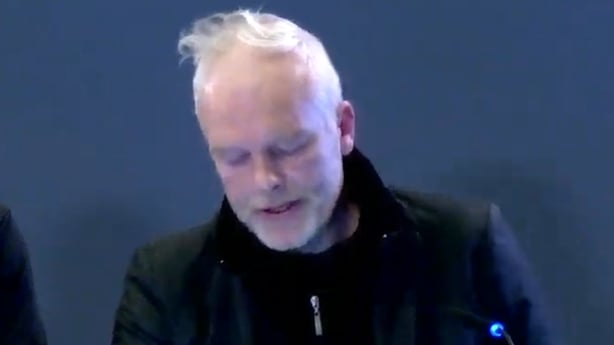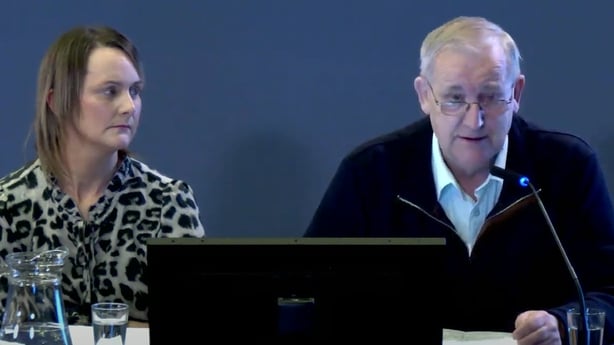An organiser of a carnival parade due to pass through Omagh on the day of the bombing said she believes many young children could have killed in the explosion if the event had not started late.
Lisa McGonigle had helped organise for a group of children to be on a float in the parade, but it was late starting as traffic in the town was at a standstill as it had been stopped because of a bomb alert.
In a statement read to the public inquiry by a lawyer, she described young people running and crying after the explosion and how she went to Omagh hospital to check if any of the children she had selected to be on a float were there.
"We were late starting, and I think this saved the children," she said in the statement read by counsel to the inquiry Paul Greaney.
"They would have been in the middle of this."
She recalled how a short time after the blast she had seen a police Land Rover pass by "with legs lying out the back".
Later at the hospital she watched as dozens of people arrived for treatment, with some carried in on doors being used as makeshift stretchers.
"I think unfortunately all of them were dead."

Survivor did not believe bomb threat was real
Earlier, the inquiry has been told how a group of friends evacuated from shops a short time before the explosion did not believe there was a bomb because the Troubles were supposed to be over and none of them believed anyone would want to target the Co Tyrone town.
That thought has been a theme of many of the personal statements from the bereaved and injured as the attack happened four months after the signing of the Good Friday Agreement.
Twenty-nine people, including a woman pregnant with twins, died in the bombing on 15 August 1998.
The youngest victim was 20 months old, the eldest 66, and 15 of those who were killed were aged 17 or younger.
More than 200 people were injured in the huge car bomb, many of them seriously.
Watch: Omagh Bomb Inquiry hearings
David McSwiggan described to the inquiry what happened on the August afternoon as "depraved insanity inflicted upon our neighbours".
"Our chat was sceptical of the bomb at the courthouse being real as the Troubles usually happened in other places and that our wee town, as much of the back water that it was, did not merit to be a target now especially as the Troubles were supposed to be over," he told the inquiry in the Strule Arts Centre in Co Tyrone.
Mr McSwiggan was with a group of friends going to a community festival in the town on the day of the explosion, a week after his 20th birthday when he was home for the summer after completing first year at art college.
He said he and his friends were standing with hundreds of people "waiting to be given the all clear" when "an immense force seemed to bring the bricks of the buildings tumbling, disintegrating around us".
Mr McSwiggan was blown off his feet and knocked unconscious for a while. When he regained consciousness he said there were "lifeless, injured and trapped people everywhere".
Read more:
Omagh Inquiry - the victims remembered
With blood pouring from a head wound, he began frantically searching for the friends he had been with.
"I started looking at the dead and injured to see if I could recognise my fiends by their clothing or their hair colour," he said.
"This proved very difficult as people were burned, covered in blood, their hair was singed and there were torn bits of people everywhere."
Now an artist, at the time Mr McSwiggan had a part-time job as a cleaner in Omagh Hospital, where many of the dying and injured were taken for treatment.
His mother was a theatre nurse who helped treat many of the victims.
He told the inquiry she has never spoken about what she experienced that day.

The world stood still for 30 or 40 seconds, says newsagent
A man who owned a newsagents close to the site of the bomb told the inquiry that "the world stood still for 30 or 40 seconds" after the blast.
"Then all the noise filled my ears. The screams and the alarms ringing," Jim Sharkey said.
He told the inquiry how he spoke to four of those killed, Geraldine Breslin, Ann McCombe, Sean McGrath and Libby Rush shortly before the explosion.
Mr Sharkey also met Kevin Skelton searching for his wife Philomena, who was later found dead.
"I will never forget the look on that man's face. I will never forget it."
He recalled how someone told his sister that he had been killed in the bombing, and how a priest had passed on his condolences to his sons in the mistaken belief that he was dead.
"The whole of the next week is just a haze," he added. "All the funerals, going to the wakes."
Mr Sharkey, who was blown off his feet by the explosion and suffered shrapnel injuries to his upper body. said he still has "vivid and horrific memories" of that day.
He told the inquiry he "went into a dark place" and gave up his business and was referred for psychological counselling shortly after the atrocity.
He now avoids going into the town centre on Saturdays.
"I don’t come into the town centre now late on Saturday afternoon or early evening anymore. I avoid it. It brings back so many memories from ten past three (the time of the explosion) and after," he said.







